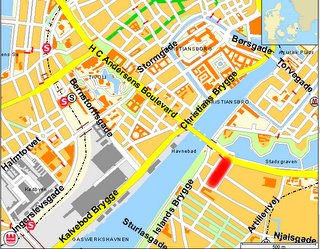2006-03-07
Sadly, one of those, who perpetuate this false information, is a Danish journalist writing in International Herald Tribune:
For 20 years, Muslims have been denied a permit to build mosques in Copenhagen. And there are no Muslim cemeteries in Denmark, so the bodies of Muslims have to be flown back to their home countries for proper burial.
"No Muslim cemeteries" So what happens to dead Muslims? Are they lying in the streets? Fortunately our Minister for Ecclesiastical Affairs has made a fact page:
The Ministry of Ecclesiastical Affairs has approved around 100 individual religious communities including Christian, Muslim, Buddhist, Hindu and Old Norse congregations. 19 of these are Muslim congregations.
And to set the record even more straight:
- In Denmark as a whole there are about 120 mosques or Muslim prayer rooms.
- In Copenhagen and a number of other cities in Denmark parts of the public cemeteries are reserved for the burial of Muslims.
- Muslim communities are free to establish their own cemeteries according to Danish law, and a large Muslim cemetery in the Copenhagen area is expected to open this year.
- No burning of the Koran has taken place in Denmark. Burning the Koran may constitute a criminal offence and result in a prison sentence.
- In Denmark there is free access to set up Private Independent Schools, which receives government funding covering 75 – 80 per cent of their expenses. This includes free access to set up Muslim schools. Currently there are 18 Muslim and Arabic Private Independent schools, with approximately 3500 pupils.
So far from being persecuted, there are 19 flavours of Islam in Denmark with 120 mosques and prayer rooms - for a Muslim population which is estimated to be between 160,000 and 200,000.
Mosques and Churches (except for the official Lutheran church) are not funded by the state as such, but contributions to churches are tax deductible and the state will support culture. All you have to do is combine the two words "culture" and "kids", and the state will pay you for teaching kids about Muslim culture, Arabic language, Koran-singing etc. etc. Ofttimes the imams are de facto paid by the state, when they - like Abu Laban - live on welfare, or like Abu Bashar work as imams in prisons.

The snag is that these 120 mosques are modest buildings: apartments, old office buildings or factories - what we don't have is impressive buildings with minarets and calligraphic inscriptions. But this does not mean that Muslims are not allowed to build mosques. On the contrary, a very large ground - close to Copenhagen's center - has been allocated for this purpose for almost 20 years. (see the area marked in red).
So why don't we have a "real" mosque yet? For a very mundane reason: If you want a large piece of property in the middle of Copenhagen, 500 meters from the Danish parliament, 600 meters from city hall, close to water and green areas, and if you want to build an imposing testament to Allah's greatness with potent minarets - you have to pay for it.
The same thing with churchyards. Areas have been allocated in the suburbs of Copenhagen - but if you cannot lie in the same general area as the Infidels, and if you want your grave to last forever - you have to pay for it.
In actual practice Danish Muslims are divided between Sunni, Shia, Salafi, Sufi, and Ayurveda - not to mention the 70-80% who hardly ever bother to visit any mosques. It boils down to a question of money and power. Those who control the mosque will have a monopoly on theology. Abu Laban says he supports a joint mosque in Copenhagen, but he will still try to build his own as well.
In Norway's capitol, Oslo, there's also a power struggle, but this is much more bloody. They have a mosque, but are fighting for control with knives and baseball bats. Fears lives will be lost in mosque conflict (Norwegian text, my translation):
Danny Iqbal Ghazanfar was present during the knife attack at the mosque Central Jamaat-e Ahl-e Sunnat in Urtegata in Oslo Friday. He tells VG Nett that he fears there will be more.
- This power struggle and the conflict in the Mosque is not over with this episode. I'm afraid somebody can lose their life here, unless the authorities intervene.
In total, six persons were hurt in two episodes of violence, within and close by the mosque Central Jamat-e Ahl-e Sunnatda during the Friday prayer yesterday.
First the labour-politician Khalid Mahmood was attacked by a man with a knife just outside the mosque. A few hours later men, armed with knives and baseball bats, ran into the mosque where many people were gathered.
According to the police, no persons were seriously hurt, but several of them wil have to spend some days at the hospital.
- Long conflict
The background for the attacks are a conflict, which has gone on for a long time, claims Iqbal.
- there are 3,000 members, but only a few handpicked directors of the board. The conflict began when one of the groups were thrown out of the board without reason.
The case is bad publicity for Islam, he thinks.
- Stop monetary support
Now the authorities have to stop the economical support of the mosque until this has been cleaned up, thinks the politician, who was the Center-Party's second candidate from Oslo during the election for the parliament last fall.
- The mosque must gather the members and let them decide, who shall sit on the board. Those who are involved in the conflict today must go away from the mosque. Until this has happened the monetary support must cease, he demands.
Added: The Norwegian newspaper Aftenposten has articles in English about the fighting in the mosque in Oslo: Politician in knife attack, Suspects in custody after mosque violence, Mosque may lose financial support
